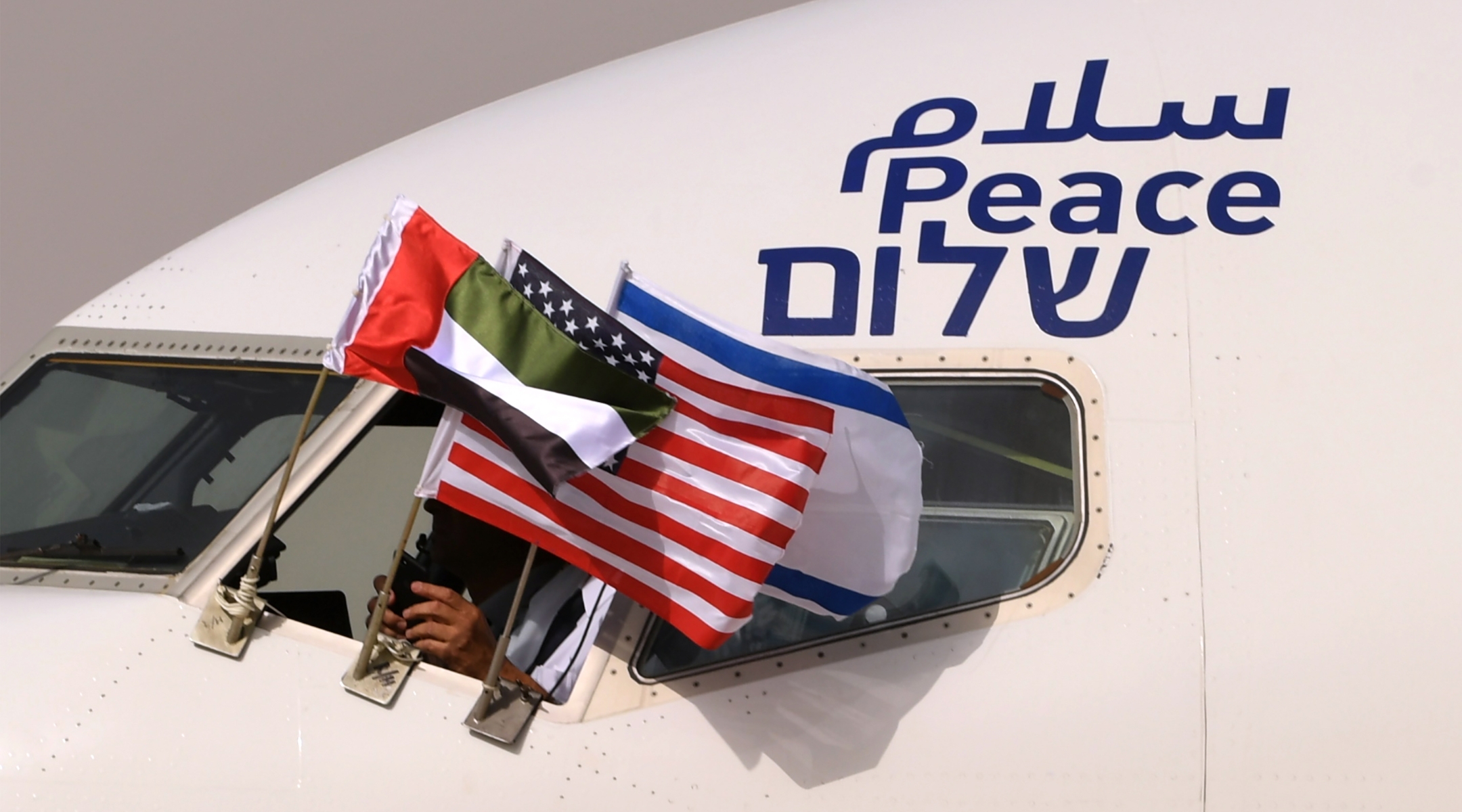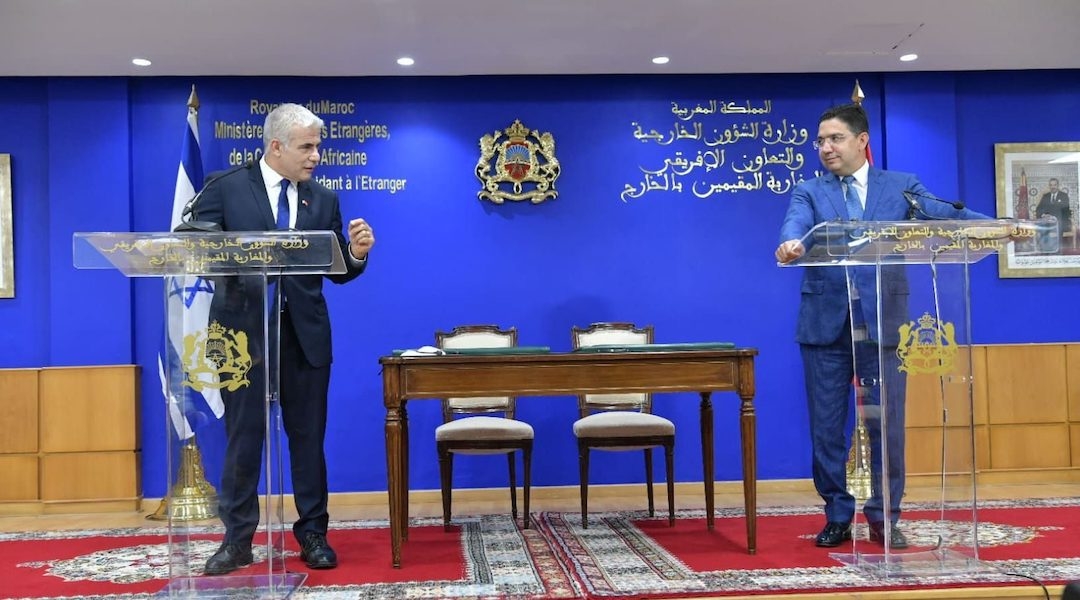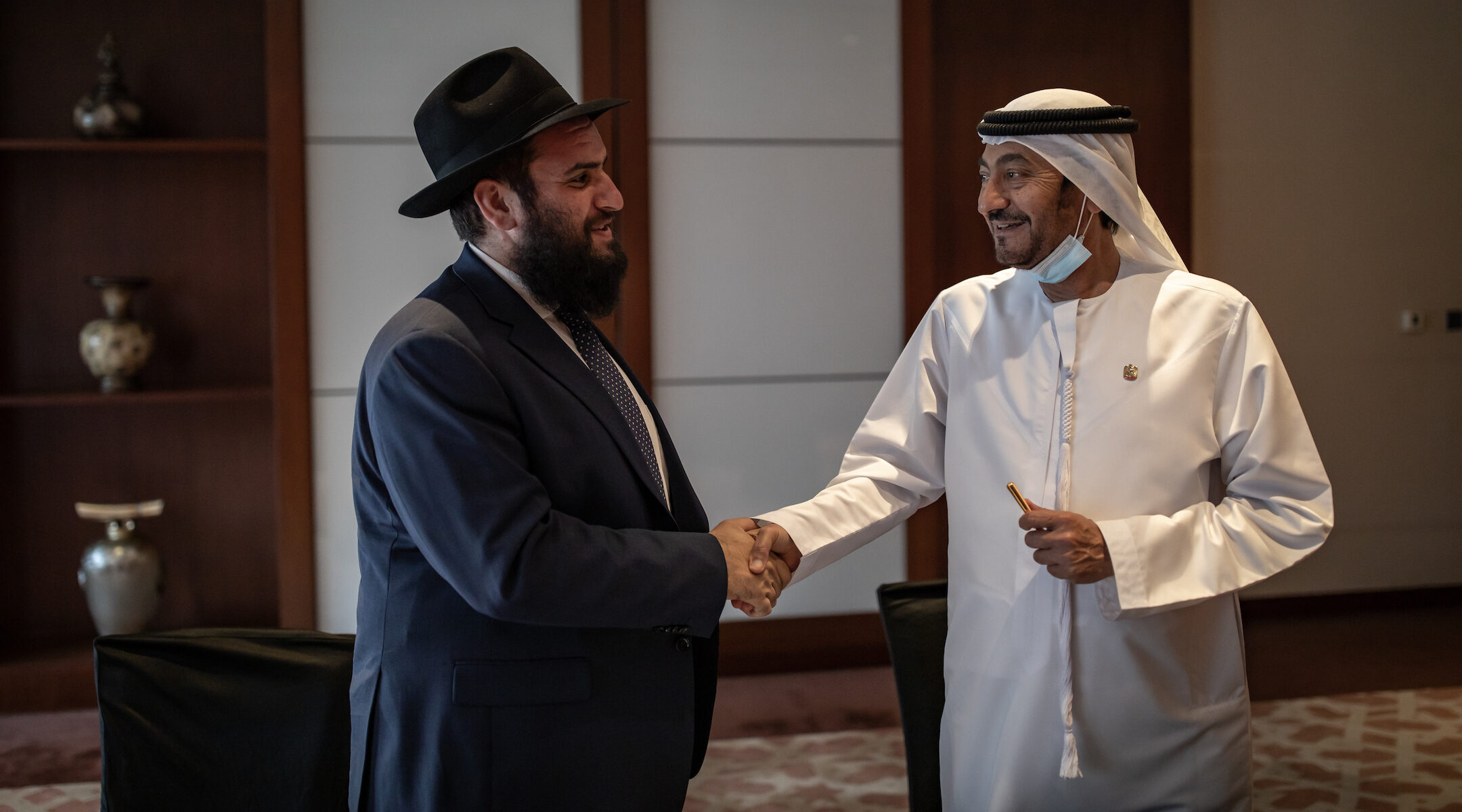WASHINGTON (JTA) — While most of the foreign policy world is focused on President Joe Biden’s moves in Afghanistan in the wake of the stunning turn of events there, the first anniversary of another important Middle East development quietly took place last week.
The first part of the Abraham Accords, the historic cooperation agreements between Israel and several of its Arab neighbors, brokered in large part by the United States, turned one year old on Friday. The United Arab Emirates signed a treaty to normalize its relations with Israel for the first time on Aug. 13, 2020, opening up collaboration on tourism, trade, technology sharing and more. Bahrain would soon follow suit, followed by Sudan and Morocco — all of whom never had formal relations with Israel.
The Biden administration did not exactly call attention to the anniversary — in fact, the administration’s spokesmen still won’t even use the term “Abraham Accords.” That’s likely in part because the agreements were a foreign policy win for Donald Trump’s team, and because Biden is prioritizing other initiatives at the moment, such as combating the latest COVID-19 case surge and addressing the fallout in Afghanistan.
“We welcome and support the normalization agreements between Israel and countries in the Arab and Muslim world,” a State Department official said last week, responding to a JTA query about the status of the accords. ”The United States will continue to encourage other countries to normalize relations with Israel, and we will look for other opportunities to expand cooperation among countries in the region.”
The degree to which the normalization agreements are thriving varies from country to country, and for the moment it doesn’t look like there are any imminent new members of the club. But the forecast by experts and peace-brokers is that the deals are here to stay. And Biden deserves some credit for that, a Trump administration official told JTA.
“The country is in a difficult moment in time and pretending that Republicans and Democrats are ideologically aligned right now on much of anything would be foolhardy,” said the Trump official, who asked not to be further identified in order to speak candidly. “And yet, here we stand with peace agreements, all with very intricate, complicated components to them, and they have really thrived in this last year and it’s important to say this administration deserves credit.”
Still, not everyone is happy about the trajectory. Jonathan Schanzer, senior vice president for research at the Foundation for Defense of Democracies, a group that is critical of Biden’s Middle East policies, said the apparent failure to commemorate the deal is sending the wrong signal.
“It’s not a deal-breaker, but it certainly does not seem terribly encouraging for the countries involved,” Schanzer said.
Almost all of the individual agreements came with key incentives, or compromises, from the side of Israel and the U.S. Here’s a rundown of how those incentives are holding up, and a look at each country’s relations with Israel, one year later.
The incentives are in place — for now
The Trump administration negotiated incentives for three of the four countries that normalized relations with Israel:
-The U.S. agreed to sell the UAE state of the art F-35 stealth fighter jets, which some — including (for a time) former Israeli Prime Minister Benjamin Netanyahu — believed could weaken Israel’s “qualitative military edge” in the region.
-The U.S. agreed to recognize Morocco’s claim to rule over disputed territory in the Western Sahara.
-The U.S. removed Sudan from listings identifying the country as a terrorism sponsor. Sudan had landed on the list after harboring the mastermind of the Sept. 11 attacks, Osama bin Laden.
-Bahrain, the headquarters of the U.S. Navy’s 5th Fleet and its Central Command, already had a close relationship with the United States and required no apparent incentives.
The human rights community immediately targeted all three of those incentives, lobbying to reverse them. Some supporters of the accords at first worried Biden — a champion for decades of a human-rights-oriented foreign policy — might accede to their demands. There were compelling arguments to reconsider the incentives:
-The UAE has acted as a sometimes malign interventionist actor in the region, most recently joining Saudi Arabia in backing the Yemen government in a devastating war against Houthi rebels who are backed by Iran.
-Recognizing Morocco’s claim to an area it has claimed by force was seen as undercutting efforts to counter other expansionist bids, for instance, Russia’s effective annexation of Crimea.
-While the government of Sudan rejects everything its predecessors stood for, families of victims of the Sept. 11 attacks are still pressing for compensation.
Biden has so far kept all of these intact. At first, he froze the UAE F-35s deal, but then recommitted to it, in part because the pro-Israel community, which had joined the opposition to the deal, dropped its objections. (A number of Democrats in the Senate still hope to slow the deal down.) The Biden administration has said that reversing the Western Sahara recognition is off the table for now. And Secretary of State Antony Blinken has accepted the terms of the Sudan deal, accepting payment for victims of some acts of terrorism Sudan facilitated in the 1990s and preserving the right of victims of the 9/11 attacks to continue their quest for compensation.
The United Arab Emirates
The UAE deal is the biggest success of the four, and Israel and the UAE have already exchanged official ambassadors. This is not in any sense a low-profile bromance: The UAE has rolled out the red carpet for top Israeli officials, including Israeli Foreign Minister Yair Lapid.

An El Al plane flying the flags of Israel, the United Arab Emirates and the United States, and bearing the word “peace” in Arabic, English and Hebrew, arrives at the Abu Dhabi airport from Tel Aviv, Aug. 31, 2020. (Karim Sahib/AFP via Getty Images)
Commercial ties are also thriving. A massive UAE investment in Israel’s offshore natural gas extraction is going ahead. Tens of thousands of Israelis visited the UAE in the months after the signing. A kosher food industry is blossoming in Dubai.
The Trump peace broker said that the Emirates’ high-profile embrace of normalization is paying off with the dividend that the Trump administration sought: A street-level embrace of Israel as a natural neighbor.
“When the Emiratis team has a rugby match in Israel, it gets covered by the UAE papers and the UAE papers are seen in Saudi Arabia and in Tunisia and in Egypt and in Oman and Bahrain and even in Iran,” the official said. “These things are changing people.”
There is still one important point of tension: Israel’s military actions against the Palestinians. Before the latest round of fighting between Israel and Hamas in May, the UAE criticized Israel’s crackdown on Palestinians protesting evictions in eastern Jerusalem. Schanzer predicted that the issue will “require some time” to smooth over.
“There is discomfort, every time there’s a Gaza conflict, or whatever the issue is, some flare-up in Jerusalem or the West Bank, it makes it more difficult I think for the UAE to engage with the IDF. That’s going to be the final frontier,” he said.
Bahrain
Bahrain, which houses a Jewish community that’s more than a century old and which has had quiet relations with Israel and the pro-Israel community since the 2000s at least, did not need a lot of convincing to buy into the accords. Two months after the signing, Bahrain’s commerce minister was in Jerusalem formalizing already existing commercial ties.
Bahrain has named an ambassador to Israel, but unlike the UAE has not yet established an embassy in Israel. Houda Nonoo, who in the 2000s made history as the first Jewish ambassador from an Arab country to Washington, said she expected the relationship with Israel to flourish.
“As we embark on a new era in the Bahrain–Israel relationship, it is important to remember that at the core of this agreement is the desire to create a new Middle East, one built on peace and prosperity for all,” Nonoo, who is still working for the Bahraini foreign ministry and who attended last year’s signing, said in a message to JTA. “I believe that the growing partnerships between Bahrain and Israel will lead to sustainable peace in the region.”
Morocco
Morocco was always seen as the easiest get: There’s a huge Moroccan Jewish community in Israel that has since the 1990s traveled back to the country on pilgrimages. And of the four countries in the accords, it has the largest remnant Jewish community. A number of Moroccan Jews are advisers to King Mohammed VI. Morocco and Israel have existing commercial and, reportedly, security ties.
The countries have so far exchanged envoys and have launched for the first time ever direct commercial flights.
But there have been some hiccups — a consequence, in part, of uncertainty for a period about how Biden would treat the recognition of the Western Sahara.
“While the ideal situation for Moroccan decision-makers would be a public statement of recognition [from Biden], the lack of a reversal in itself is a win,” said Yasmina Abouzzohour, a visiting fellow at the Brooking Center in Qatar who is an expert on Morocco.
Another factor impeding a full-fledged mutual embrace has been the country’s elected government, which is more Islamist than the royal court.
Abouzzohour said the pluses the media has played up are the economic ties, the concomitant strengthening of ties with the United States and the potential for Morocco to have a bigger role in helping bring about a resolution of the Israeli-Palestinian conflict. But she said the average Moroccan citizen on the street was not thrilled about the relationship.
“The Moroccan population is overwhelmingly pro-Palestine,” she said. “It will be extremely difficult, if not impossible, for this to change. Israeli violence in Jerusalem and Gaza in May 2021 did not help the matter and led to numerous protests across the country.”
Israel’s foreign minister Yair Lapid landed in Rabat on Wednesday and met with his counterpart. He made it clear Israel wants the deal to advance. “What did we achieve from all these years, during which the relations between our two ancient and proud nations were severed?” he said. “Nothing. What did our citizens gain? Nothing. Today, we are changing this. Today, we are changing this for the benefit of tourism and the economy, for trade and cultural exchange, for friendship and cooperation.”

Israeli Foreign Minister Yair Lapid, left, confers with Nasser Bourita, his Moroccan counterpart in Rabat, Morocco, Aug. 11, 2021. (Shlomi Amsalem, Israel Government Press Office)
Sudan
Sudan is another country that has long had sub rosa ties with Israel; it played a critical role in the 1980s in the wave of Ethiopian Jewish immigration.
Right now, its deal with Israel is stuck, as the two sides hash out details — not because any of the parties are having second thoughts. Sudan’s government is contending with internal tensions as it transitions to democracy that have frustrated its overall efforts to engage with the international community.
“There have been a few delegations from Israel to Sudan, not the other way around, that’s been postponed and postponed and postponed,” said David Pollock, a fellow at the Washington Institute for Near East Policy who tracks public opinion in the Middle East. “There’s a lot of potential in Sudan, for technical cooperation in many different areas — water, agriculture, energy. But it continues to be of course a country that has many internal divisions, and a very fragile, kind of government. Although, it’s muddling through pretty well considering.”
Who’s next?
The big domino that could lead to a cascade of mutual recognition in the Arab and Muslim worlds is Saudi Arabia.
But that’s not likely to happen soon: Lawmakers in Congress, mostly Democrats but a number of Republicans as well, see the country as toxic because of its human rights abuses, including its murder of a U.S.-based journalist in 2018, and because of its Yemen war interventions. Biden, even if he were inclined to deliver the incentives Saudi Arabia would demand to hop in, would face resistance domestically.
That said, there are a number of countries that already have informal ties with Israel that could easily transition to full-blown ties, among them Oman, Mauritania, Indonesia and Qatar.
JTA has documented Jewish history in real-time for over a century. Keep our journalism strong by joining us in supporting independent, award-winning reporting.






